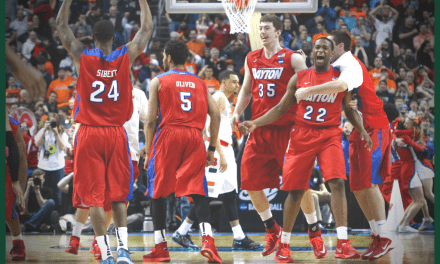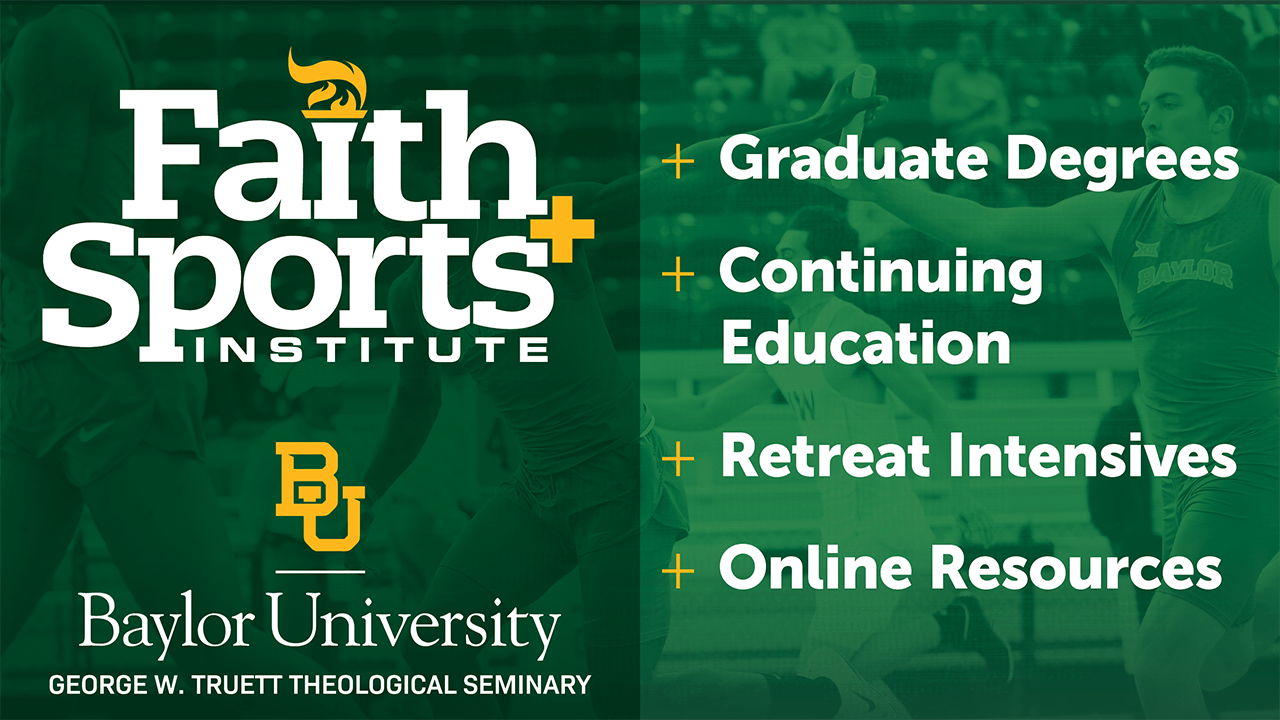Editor’s note: To help Christian sportspeople navigate these uncertain times, we will be publishing a series of posts focused on what it looks like to “Run The Race Well” in a time of coronavirus and quarantine. We will be getting contributions from a variety of perspectives: theologians, philosophers, athletes, coaches, mental health professionals, seminary students, and more. This post comes from John White, Associate Professor of Practical Theology and Director of the Sports Ministry Program at Truett Seminary.
John White
Journal entry: April 3rd is my birthday. Another day spent sheltering in place. Many emotions.
My birthday falls toward the end of March Madness, often on the Final Four weekend, and one week before the Masters. I’ve gotten into the habit of enjoying these events every year around the same time. But of course COVID-19 changed all of that this year. With no sports to watch, it got me thinking more deeply about my early April rituals, and the way the pandemic has laid bare our most basic ways of doing life together.
So let’s reflect on these two rituals—birthdays and sports—and the meanings and messages that they proclaim.
Sports
We start with sports. By now you’re well aware of the new reality. No March Madness. No College World Series. No Wimbledon. The 2020 Olympics are now scheduled for 2021. We have not had this magnitude of sports cancellations since Word War II. Although the saddest and most permanent part of COVID-19 devastation is the death and suffering of human lives, the pandemic has also brought a screeching halt to the sports we so cherish and love.
What is it about them we miss? We miss the glory of underdogs, such as Lehigh when they upset Duke in the 2012 NCAA tournament. We miss the unexpected comebacks: Jack Nicklaus winning the 1986 Masters at age forty-six or Tiger Woods overcoming an eleven-year majors drought to claim the 2019 Masters. For us older fans, ABC’s Wide World of Sports’ tag line, “The thrill of victory and the agony of defeat,” gets at what we miss. We miss admiring and acknowledging greatness in the manifold ways it breaks through, often serendipitously, in high school, college, and professional sports.
The late Yale University philosopher Paul Weiss captured it well:
Excellence excites and awes. It pleases and it challenges. We are often delighted by splendid specimens whether they be flowers, beasts or men. A superb performance interests even more because it reveals to us the magnitude of what then can be done. Illustrating perfection, it gives us a measure for whatever else we do.
Athletes in action test and display their speed, perseverance, strength, and agility, and when done well, they testify to intoxicating values such as beauty, goodness, and excellence. We long and thirst for such weighty values. Sports are one of the many places we can relish and celebrate them. When we stand before a famous piece of art or listen to some rapturous music, the beauty that our eyes see and ears hear stirs something deep in our souls, not unlike when we watched Kobe Bryant’s grace and grit wonderfully combine in an acrobatic, twisting shot when the game was on the line.
In short, sports are part of a family of rituals or ceremonies in which we can recognize the accomplishments and performances of others.
Birthdays
Birthdays are different in at least two important respects. First, at their core, birthday celebrations are not about what we have accomplished. Birthdays do not recognize nor are they some kind of exercise in receiving approval for some spectacular performance. If you can recall attending a first birthday celebration, the focus was not on what a baby girl had achieved but on the uniqueness of who she is. The colorful balloons and wrapped presents, sparkling candles, happy birthday song, and smiling faces exemplify that someone is very special.
Sadly not all children and grown-ups receive the positive recognition that they deserve on their birthdays. Still, the cultural expectation for birthdays is one of happiness and well-wishes. Birthday celebrations place the recognition squarely on persons.
In sports, the recognition lies elsewhere. Recognition in sports is merit-based. The honors and accolades are conferred on the basis of meeting certain conditions. When you perform well, you earn praise, but when you fall short you can earn scorn, shame, and blame. This single way of seeing ourselves means our value is transient.
On a birthday, we recognize the inherent worth and value of a person simply for who they are, full stop. Birthdays appreciate and regard an enduring worth which no amount of achievement or victory can rival. Birthdays bring us in joyful and loving contact with the truth that we are persons with dignity first. Vocations and activities such as coaching and competing follow from birthdays. No birthday. No athlete.
Second, birthdays focus on something we all share in common. Everyone has one. Achievements in sports, on the other hand, are not universal. Not everyone will achieve greatness in activities such as basketball or football, but on a birthday, we remember that everyone is graced with the fragile gift of existence—something that natural disasters and pandemics poignantly threaten.
Birthdays, then, proclaim that our worth comes from God who made us in God’s image (Gen. 1-2). Our achievements do not add to nor take away from our God-determined value.
Although mourning the loss of incomplete seasons makes sense on one level, achievements or lack thereof should not define us on an ultimate level. Accomplishments and records fade and eventually get broken and surpassed, while personal dignity remains and is fundamentally unique. There will never be another you or me in this world. Birthdays declare that people are beautiful and sacred, irreplaceable and unrepeatable. This is not something we lose, gain, or get from fellow humans.
When our games come back and we can watch sports again, let us be birthday-minded people. Let us see athletes and coaches as more than their competitive roles and successes, and appreciate first and foremost their primary dignity derived from God and enlivening their entire person. This dignity governs all other kinds of recognition and approval; this is what we glory in on happy birthdays!
It’s a dignity that no pandemic can ever quarantine, isolate, or cancel.
 About the author: Dr. John B. White is the Harold and Dottie Riley Associate Professor of Practical Theology and Director of the Sports Ministry/Chaplaincy Program at Baylor’s Truett Seminary. He received his PhD from The University of Edinburgh where he studied moral theology. Prior to that, he spent nearly two decades serving in sports chaplaincy and ministry in a variety of different contexts. A widely recognized expert on the intersection of sports and Christianity, he has been interviewed by national media outlets including CBS, Sports Illustrated, Wall Street Journal, and USA Today. John’s publications have appeared in Sport, Ethics and Philosophy, Implicit Religion, Studies in Christian Ethics, and Practical Theology, and he recently co-edited books with Routledge Press (2016, 2018), Cambridge Scholars, and Mercer Press (2017). If you are interested in studying theology and sports, sports chaplaincy, or sports ministry, consider joining John in Truett Seminary’s Sports Ministry Program.
About the author: Dr. John B. White is the Harold and Dottie Riley Associate Professor of Practical Theology and Director of the Sports Ministry/Chaplaincy Program at Baylor’s Truett Seminary. He received his PhD from The University of Edinburgh where he studied moral theology. Prior to that, he spent nearly two decades serving in sports chaplaincy and ministry in a variety of different contexts. A widely recognized expert on the intersection of sports and Christianity, he has been interviewed by national media outlets including CBS, Sports Illustrated, Wall Street Journal, and USA Today. John’s publications have appeared in Sport, Ethics and Philosophy, Implicit Religion, Studies in Christian Ethics, and Practical Theology, and he recently co-edited books with Routledge Press (2016, 2018), Cambridge Scholars, and Mercer Press (2017). If you are interested in studying theology and sports, sports chaplaincy, or sports ministry, consider joining John in Truett Seminary’s Sports Ministry Program.






